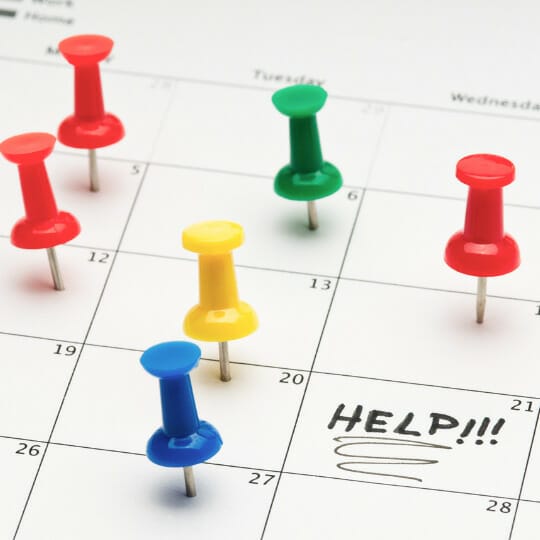
Are you a business owner who is feeling a bit stressed and like you might be heading for burnt out? Today, I want to talk about 8 important business boundaries – boundaries that you set during your working day – that can help you to beat burnout, so you can maintain flow and productivity at work, with ease.
Burnout is the state of mental, emotional and often physical exhaustion that is created by prolonged or repeated stress.
In other words, it’s when we are regularly stretched beyond our capacity and resources that we start to feel burned out.
Burnout is an important topic that’s relevant right now to so many people. Let’s explore how it can happen, and then, look at 8 work boundaries to help you beat burnout.
I have been talking to a lot of people recently about burnout in business and it’s clear that burnout is about more than just self-care.
One story stands out in my mind as an example. She is a business owner who says she has learned to set strong boundaries in her personal life and has been maintaining reasonable self-care, but still feels burnt out, and for quite a while, she couldn’t figure out why.
It turns out that she had mastered boundary setting and goals in her personal life but hadn’t translated these skills into her business.
In her personal life, she is exercising, eating well, meditating, reading and learning, going to bed early and spending time with friends and loved ones.
Yet it’s been the opposite in her business until fairly recently.
In the past, she had been pushing herself hard each day, overbooking herself, setting unrealistic deadlines, rushing through tasks in order to feel productive, using coffee to maintain her momentum, comparing herself with the perceived success of others, and striving for exorbitant goals.

Because of these behaviours and habits, she’d often been working late and sometimes on weekends without any defined need or purpose and feeling increasingly anxious and stressed.
And previously, she might notice these signs and think she just needed a holiday. She’d have a wonderfully restful break and then, promise herself that she’d take things easier when she got back to work. But pretty soon, things would ramp up again and she’d be back on the road to burnout.
Does any of this sound familiar to you?
This is just one version of how burnout can happen. I have been forming some concepts about some of the contributing factors over the past couple of years which I’d like to share with you now.
We all know that beliefs and thought patterns contribute to the behaviours that cause burnout.
But that aside, I have noticed that there is a clear relationship between your planning skills, ability to set boundaries and burnout.
If you’re interested, I have touched on some elements of this in my previous podcast episodes 112, 113, 114, 149 and 150 (if you want to go back and visit those).
Here’s how I see that they are related.
Firstly, if your planning isn’t effective, it can be hard to set and maintain healthy boundaries around the plan in order to deliver on it.

Think about that for a moment in this example. Let’s say you are brand new to business and you make an ambitious plan to service 50 clients by the end of this year.
What happens if you haven’t got clarity on the steps, processes and tasks to get there, and haven’t mapped them out clearly enough?
Chances are, you won’t identify the skills or support you might need to reach your goal.
You’ll struggle to gauge whether your plan is realistic and achievable.
Your poorly mapped tasks might take 3 times as long as you thought.
You might get stuck in the minutiae of putting out fires as you desperately try to wade through your plan.
And as you creep closer to the 12-month mark, determined to stick to your plan, you might start to break some of your own rules in order to achieve the 12-month goal at all costs.
Like working past 5pm. Like working weekends. Like lying awake at night and losing a lot of precious sleep as you ruminate on your to-do list.
Hopefully, you can see that good planning can help you to be better with your business boundaries – that they are largely intertwined – and that if you can do well with planning, then boundaries are easier and burnout is less likely.
As I mentioned earlier, I don’t want to dive too deep into the psychology and beliefs, but I do want to mention the phenomenon known as Parkinson’s Law.
Parkinson’s law is a term coined by Cyril Northcote Parkinson in 1955 to describe the negative relationship between bureaucracy and productivity.
Later, it was translated into an adage that “work expands or contracts so as to fill the time available for completion.”
In other words, if you have a 38-hour work week available, your natural tendency is to fill all the gaps with work.
Similarly, if you have a deadline, you can enjoy the luxury of procrastinating for weeks and then finally get the job done in the last hour before it’s due.
This law can apply to money and household items too!

It’s clear that setting time boundaries at work is critical for your ability to be productive and effective. The success of Tim Ferriss’ book The 4-hour Work Week is a testament to this; it’s basically a manual on how to manipulate Parkinson’s Law.
Overall, in this discussion about boundaries and burnout, it’s clear that humans are good at creating work for themselves, whether it is necessary or not, and that is also something that can lead to burnout.
If you have your self-care and personal boundaries in order – great! If not, go back to my previous podcasts I mentioned and take a listen.
Now, let’s talk about 8 important business boundaries that you can set to maintain flow and productivity at work, with ease.
(1) Scheduling – one key task per day
Scheduling is the most important part of planning, and it relates to the planning step I mentioned earlier. If you schedule properly, your finish work boundaries and lunch break boundaries are much easier to uphold!
When scheduling your week, remember that new tasks or project tasks invariably take longer than you planned, you will get blindsided by unexpected events, people will cancel, and you will get new and or urgent invitations.
When running a business, accept that you will constantly pivot to some degree, whether you like it or not.
So with all that said, the best way to accommodate this is to set only one key task to complete per day (more is a bonus) and leave a chunk of white space in your diary for the unforeseen or under-scoped tasks.
This is a challenging boundary at first, but it gets easier as you start reaping the benefits of a calm mind and more productivity than you thought possible.
(2) Scheduling – one free day (or half day) per week
Building on the planning theme, I find that one full day with no meetings – absolutely not negotiable – is a great chance to catch up, work at a slower pace, and be creative.
Without the urgency or interruption of meetings and appointments, you can be super productive and feel like a champion. Try it.
The boundary is to resist the temptation to squeeze in that meeting or phone call so it’s out of the way. Challenge yourself; stay strong.
(3) Maximum meetings
One final point on planning – this is my personal favourite – limit the total number of meetings or client appointments you have each week.
Meetings can be energizing, but too many can be draining, or even frustrating, and they can rob time from tasks that require focus and critical thinking.
Humans are wired to distract themselves, so a day peppered with meetings gives you a mental ‘excuse’ not to start a task because you ‘don’t have time’.
After a good year of observing myself, I realised that my capacity is 10 meetings per week.
More than this, and I start to panic that I won’t get any work done, or I can’t get enough focused time to do the project or other desk work I must do.
Learning to postpone or reschedule fits into this category too – it’s a good boundary to have to help you maintain flow, energy and productivity.
(4) Work with your energy
Related to scheduling, and in the vein of David Allen’s model called Getting Things Done, it makes sense to work with your natural energy cycles and make the most of the highs and lows.
The way it works is like this. Let’s say you have 2 – 3 tasks you need to do on a particular day, and a meeting.
If possible, set the meeting at a time when you know you feel calm and present, like 11am.
For your other tasks, you can predict how your energy will be and plan accordingly, and feel free to shuffle around on the day in case anything has changed.
It’s order and disorder in harmony.
For me, I often feel creative first thing on a Monday and it’s a great time to map out podcast topics.
But some Mondays I know I have a deadline and I can’t think creatively, so I’ll do the urgent stuff first, take a break, and relax and get creative in the afternoon.
Honouring your body’s basic needs is a trickier boundary to set as it relies on self-observation and a willingness to adjust last minute. But once again, the reward is greater than the cost.
Imagine feeling like you are in flow every day, making the most of how you are feeling in each moment?
(5) Watch your caffeine intake
Putting my health coach hat on, coffee is delightful and it’s a stimulant and diuretic.
There is a t-shirt that says coffee: energy to do stupid things faster. The t-shirt is right.
If coffee makes you speed up, your sense of urgency will increase, you might start rushing, panicking, feeling like you’re short on time….and then comes the frenzy.
Calm the farm and watch your caffeine. It is found in green, white and black tea to a lesser extent, nootropic drinks and coffee, energy drinks and cola drinks.
Most people can stay calm at one or maybe two cups per day. Don’t push the friendship; keep your boundary on simulants at work so you can remain calm and focused.
(6) Drink enough water
I created a 50-day program for myself in 2021 and the life changing moment was realising the impact that hydration has on my energy, focus, mental clarity and cognitive function. I was in a better mood and more motivated.
The boundary is simply this – do something to remember to drink enough water.
My simple trick is to fill my 750mL bottle first thing, put it next to my mouse, and aim to finish it by the time I eat my lunch, and refill it then to finish the second one by 6pm. Works a treat.
Your needs are affected by your age, gender, size, activity levels and temperature, but generally most people need 2 – 2.5L/day (women need slightly less).
If you are thirsty or often hungry, you are definitely dehydrated. Water is a game changer and a great business boundary to uphold.
(7) Saying no when you’re tired
So many people try to push through to finish a task, or to be efficient, or to get meetings done. If you can recognise when you’re tired and are at capacity, then you can more easily set a boundary and say no to yourself and others so you can rejuvenate and avoid the slippery slope to burnout.
Let’s face it – tired people tend to make mistakes, do shoddy work or lose concentration and focus, then may try to compensate by pushing themselves. All of that is counterproductive.
Saying no gives you breathing space to re-energize and create true value in your business.
Finishing work at a set time falls into this category – but be flexible enough to finish early if you need to.
(8) Step back and review urgency
If you’re busy, tired, have a flood of emails or meeting requests, it’s easy to get sucked into the vortex of urgency for unimportant things, that aren’t really that urgent at all.
Stepping back or as I call it, zooming out each day to review the urgency of tasks is a really helpful way to prioritize time, reschedule and stay calm. I have often caught myself feeling a rising sense of panic, and then ‘zoomed out’ to look logically at the tasks I am working on to ask myself – how urgent is this REALLY?
It’s an eye-opening thought interrupt that helps you calm down, re-assess your priorities and make the changes you need to stay on top of your game.
The boundary is having the discipline to step back and review rather than forge ahead.
Wow, we covered a lot today.
We talked about how all the personal boundaries in the world don’t prevent burnout – you need to transfer the skills of planning and boundary-setting to your business if you want to remain calm, focused, productive and resilient.
I mentioned the complicating factor of Parkinson’s Law, which is our innate desire to expand our work to fill the allocated schedule.
And I covered 8 business boundaries that might help you regain your balance, focus, optimism and avoid burnout. They are:
These are what works for me, and I encourage you to have a try. And I’d love to hear your feedback – which business boundaries work for you?
Understanding who you are and what you need will allow your business to thrive! If you’re truly ready to break old habits and get out of the rut I encourage you to check out the Habitology membership.
Learn more here:
© 2024 Melanie White